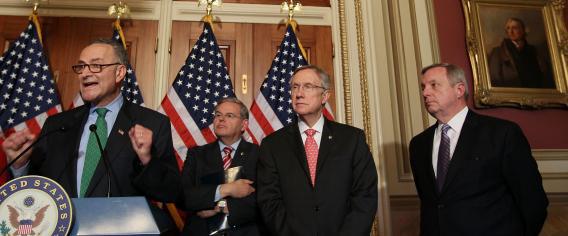Passing big bipartisan bills that make America and the world a better place doesn’t seem like the kind of thing the United States Congress has been very interested in for the past several years, but the framework unveiled today by a Senate gang of eight looks very promising. The signatories are Chuck Schumer, Dick Durbin, Robert Menendez, Michael Bennet, John McCain, Lindsey Graham, Marco Rubio, and Jeff Flake. That’s a blend of Democrats with close ties to the party leadership and Republicans with a reputation for going rogue—probably the right configuration of forces for this issue.
The framework features extra money for border enforcement and the establishment of a border commission composed of governors, attorneys general, and the like from border-area states. It will provide for automatic green cards to “immigrants who have received a PhD or Master’s degree in science, technology, engineering, or math from an American university.” It will also create what I take to be an enlarged agricultural guest-worker program, only with some mechanism for veteran guest workers to earn green cards. It will provide a mechanism for unauthorized migrants to turn themselves in, pay a fine and back taxes, and receive provisional legal status.
What happens to you then depends on both your circumstances and the national circumstances. People who were brought to the country as children and who receive provisional status will basically be put on a fast track to a green card. Agricultural workers will enter the new agriculture-specific program. Nonagricultural workers who came to the country illegally as adults go into a kind of holding pattern until the completion of new border security measures. Once that’s in place, they’ll be able to apply for green cards.
This is a “framework” and not legislation, so there are lots of loose elements and further questions one might ask. But all in all it seems like a humane and sensible approach that will, among other things, do more to improve the fiscal position of the United States than all the discretionary spending caps in the world. If I have any big complaint, it’s that the bill is oddly timid on the less controversial high-skill piece. What’s the fear of America being overrun by foreign economists, lawyers, doctors, and other skilled professionals who don’t have STEM advanced degrees? For that matter, what’s wrong with foreign-born STEM workers who did their graduate work in the United Kingdom or Canada or France or India or Japan? And do skilled STEM workers really all have to have advanced degrees? Where’s Bill Gates’ PhD? I feel confident we can do better on this front.
